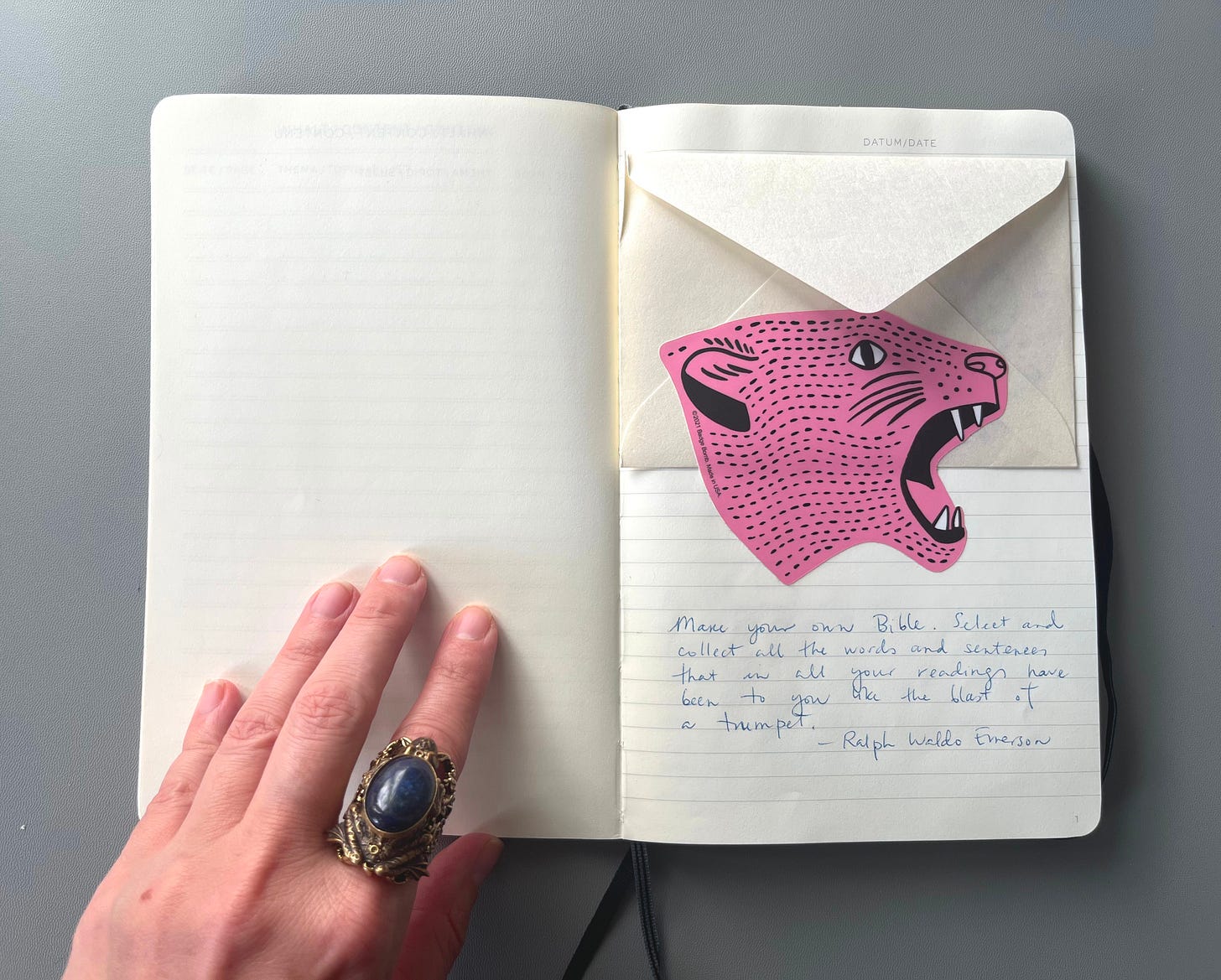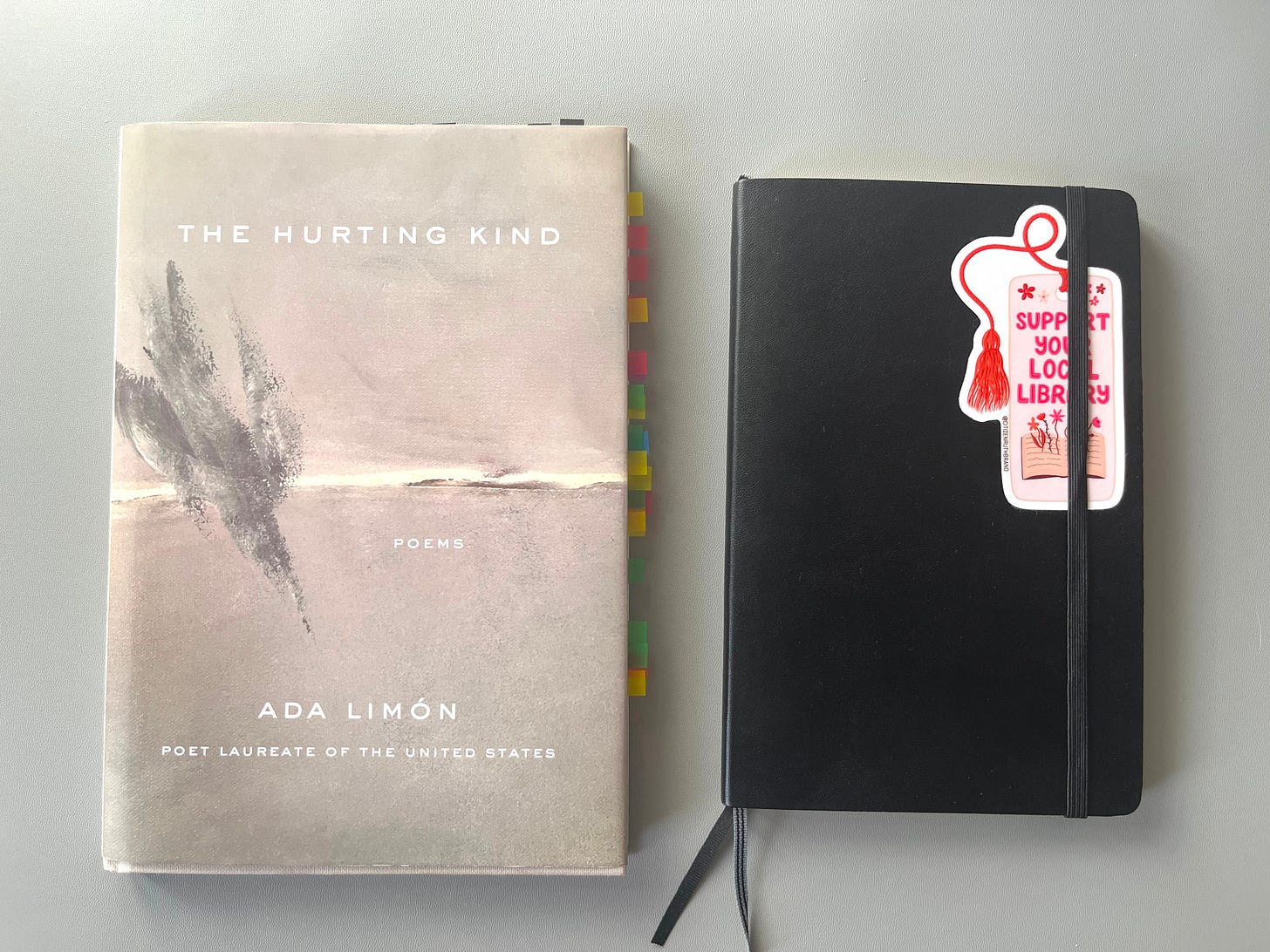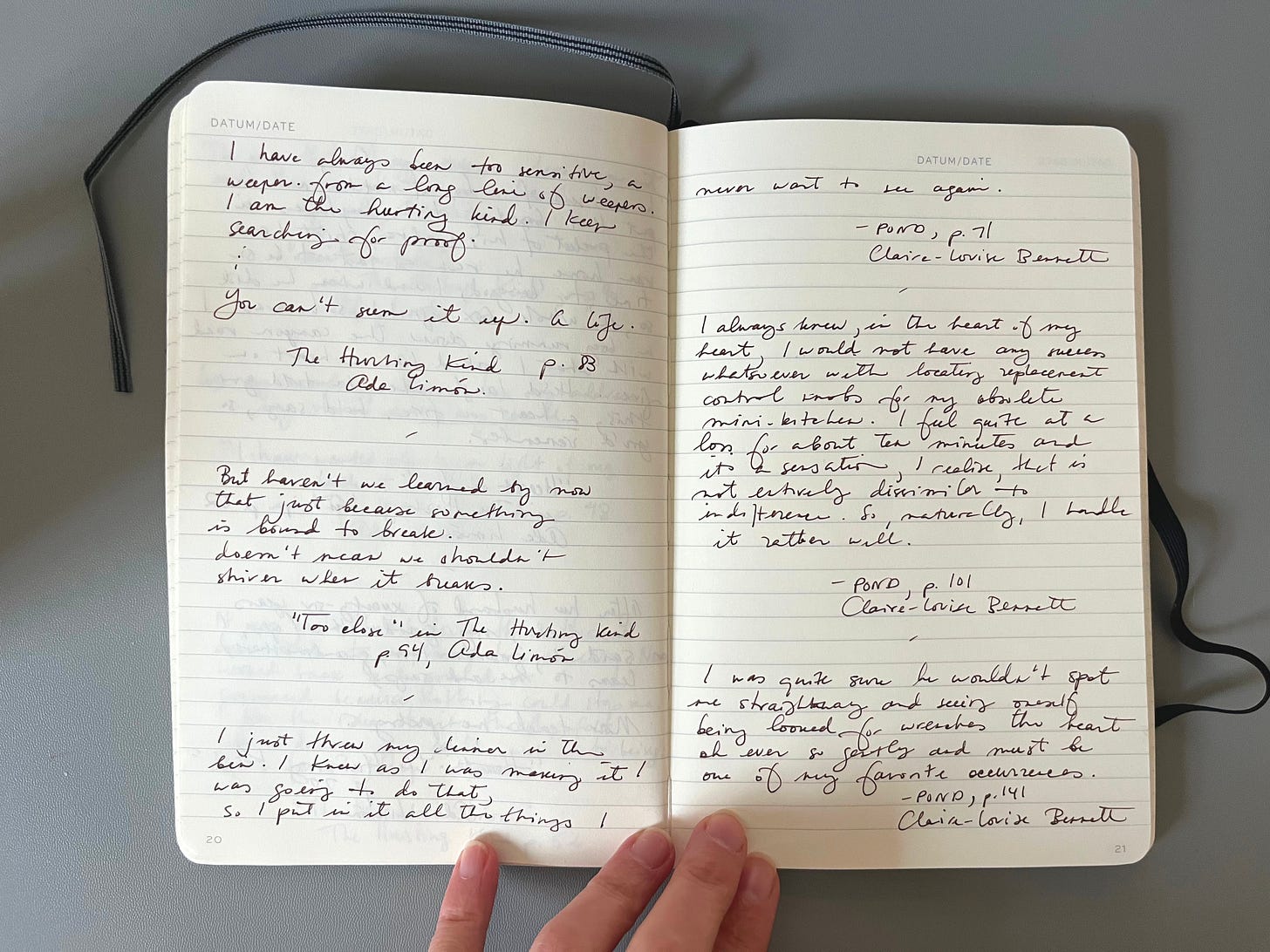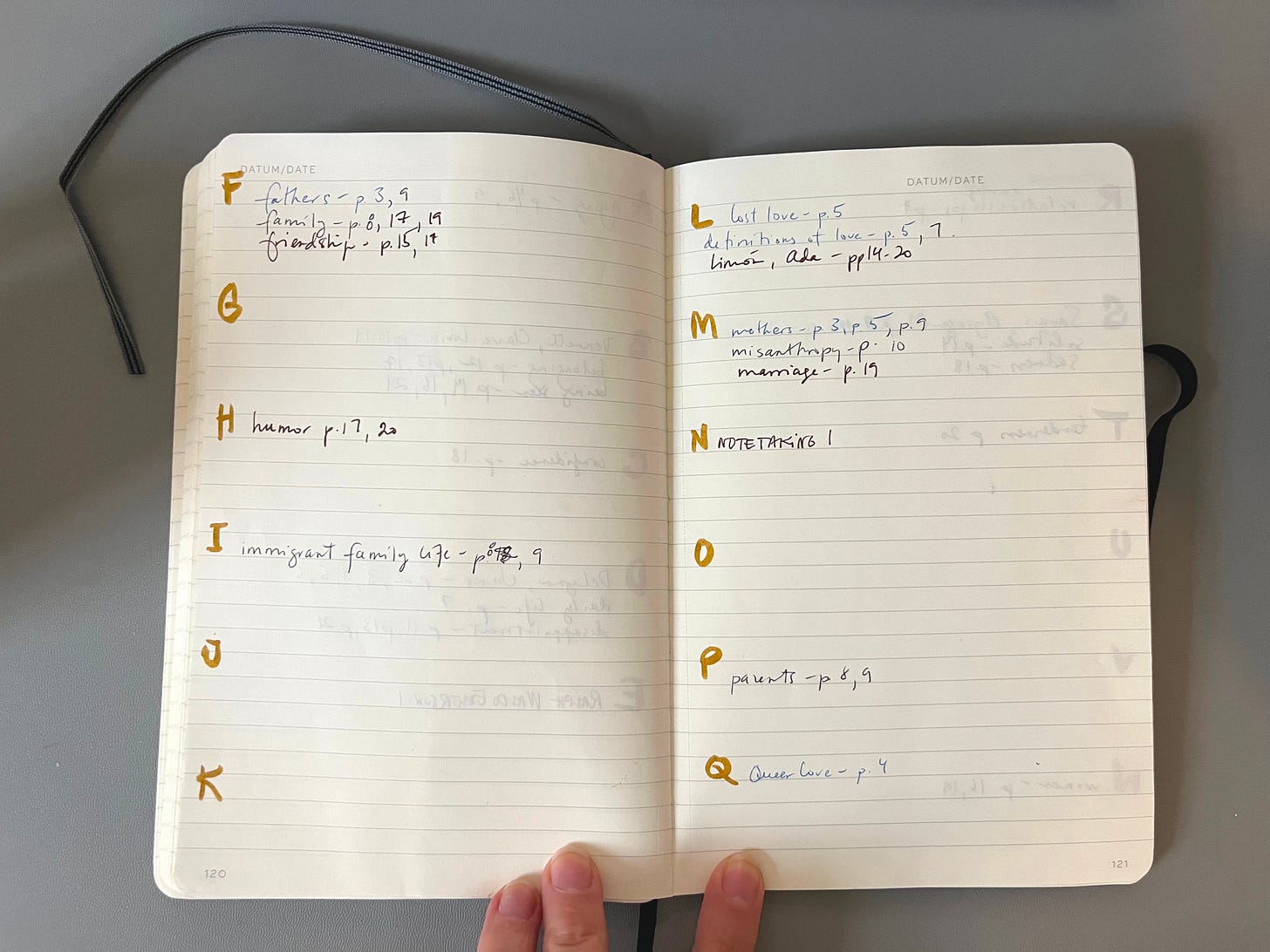Issue 107: Commonplace journaling for mere mortals
Your Reading Spirit, embodied
In this post:
Why I started commonplace journaling
A simple, sustainable system for collecting and organizing your favorite quotes
Early insights from my practice
I have been thinking a lot lately about how my 7-year-old daughter will remember me when I'm not around anymore, really wanting to leave her with a lasting impression of her mother living an inspired life. I know it's difficult and probably unadvisable to engineer memories, but she already has an awareness that I am a reader. What I want to be able to leave behind is an embodiment of my reading spirit. Our family book collection will be hers, of course, but I also love the idea of leaving her a stack of notebooks that contain quotes that challenged, moved, or entertained me. I want her to have a record of what made me feel alive. No shade, but my stack of Morning Pages journals is not it.
Beyond this deeply personal motivation, I love language — I wouldn't be a reader if I didn't. But it wasn't until last year when I first started reading more closely and annotating my books that I felt the need to begin collecting my favorite quotes. I can always reference a book on my shelves, but I wanted a more immediate way of interacting with these preserved snippets of text. To paraphrase Walter Benjamin, a famous book collector and certifiable nerd, not only did I want my books to come alive in me; I wanted to live in them. I just really wanted the books I love to have a longer afterlife.
After sharing my annotation practice months ago, I mentioned I was still searching for a way to collect my favorite quotes. Many of you suggested trying commonplace journaling. I went down a massive research rabbit hole, participated in ’s Winter Commonplace Book Club, and after some trial and error, I am excited to share where I've landed and why I think this is a practice you should try.
For years, I hesitated to start a commonplace book because the examples I'd seen were stunningly beautiful and therefore felt completely out of reach. Not because I couldn't START such a project but rather because I couldn't keep one up. My experience with distilling my own annotation process last year gave me the confidence that I could figure out a simple, straight-forward process for commonplace journaling too that works for ME. I am aware that the photos / examples I have included in this post are not especially “aesthetic” but I am ok with that. The aesthetics of the journal reflect the level of effort I can devote to this project in order to get what I need out of it without creating a whole new bureaucracy.
1| Notebook
Notebook preferences are personal and, ultimately, I don't think it really matters what you use, BUT I have been loving my Leuchtturm1917. I have the lined B6+ version which is slightly smaller and more charming (to me) than the traditional journal size. I really like it. It's a decent quality notebook from a reputable brand that will hopefully continue to be in business for years to come. That's important to me because I plan to continue buying the exact same notebook — I really like looking at a uniform stack on my shelf.
2| Pens
For pens, I keep it simple - cheap ballpoint pens or Pilot G-2s in off-beat colors (dark navy, maroon, grey). Recently I got some Zebra Sarasa Clip pens (brown) and am really loving those, too. The only requirement is .5 or thinner because I write small.
3| Structure
My commonplace journal has three sections: the opening page contains a Ralph Waldo Emerson's quote which sets the intention for the project.

Make your own Bible. Select and collect all the words and sentences that in all your readings have been to you like the blast of a trumpet.
— Ralph Waldo Emerson
I love this so much. The purpose of the notebook is not to collect everything that I read and like. The purpose of the notebook is to collect the words that make me feel AWAKE to life.
Then, the bulk of the journal is the quote collection itself — I do not decorate or do anything especially refined with the pages. And finally, I have added an index — which I am not quite passionate about — that grows organically as I add new themes I discover in my reading.
To make this manageable, I currently only use my commonplace journal to collect quotes from books I'm reading in the current month. Of the 7 complete books I read in January, I annotated 2 and copied quotes from 4 of them, resulting in about 20 small pages worth of quotes.

Instead of forcing myself to work on this notebook daily, I work in bursts upon completing each book as the final step of my reading process. Last week, I took myself on a solo coffee date to add quotes from The Hurting Kind, and sitting there with my coffee and notebook, I felt such pure joy I thought I might cry.
When adding quotes, I don't copy everything I've underlined, only what feels essential to preserve. I tried to create rules about what or how much to include but realized my intuition is a strong enough guide.
One of the main reasons why I haven’t started doing this sooner was that I was worried about discoverability. What’s the point in having a book of quotes if you have to read through the whole thing in order to find the one you need. I have a note on my phone where sometimes I type in or scan quotes from books I am reading. It’s not whimsical but it’s practical. I couldn’t figure out how I would replicate that level of ease and usability on paper. Well. Nerds on the internet delivered — the solution to this problem was to create an index. The most helpful resource I found on the topic came from the software developer Soren Bjornstad. My professional biases are showing here but I do trust an engineer to teach me about managing data.
I reserved 5 pages at the end of the notebook for my index and created sections for each letter. Soren has some thoughts on how much space to leave for each one. I did equal spaces this time since I am still figuring out how my brain works in this scenario.
Then, as I finish reading a book and after copying the quotes I want to preserve, I review my existing index categories. I try to add to existing categories first and add new categories as I go on an as needed basis.
I am still refining my index categories. There is an art and a science to this. You don’t want your index terms to be so general that they are meaningless. Also, you obviously don’t want to go too granular because that defeats the purpose of categorization. For now, I add them as I go and pay attention. I imagine my indexing skills will improve with time.
This practice has already revealed itself to be deeply rewarding. It takes me about 30 minutes per book to transfer quotes, perfect for those empty pockets of time like my kid's gymnastics practice when I'd otherwise be scrolling. I haven’t read through the journal every day but because I do the copying one book at a time, I find myself returning to it frequently, re-reading certain passages and starting to fantasize about using the notebook to even memorize favorite lines. I'm also remembering authors' names (spelling) more easily now!
The index is proving invaluable. When I wanted to find Claire Louise Bennett's thoughts about parties, I checked under "misanthropy." Looking for that Ada Limón poem about old mares? It's right there under "friendship." While I could digitize these (my Notes app can actually read my handwriting), the manual process helps me absorb and remember these more deeply which — to me — is exactly the point.
The most fascinating part is how the collection has started speaking back to me. As my index grows, it reveals patterns in what catches my attention across authors and genres - themes of belonging, feeling seen, disappointment, solitude and isolation, lost youth. It's becoming a map of my reading mind. Far from being pointless and backwards looking, it is showing me what I actually care about before I’ve had a chance to put my finger on it myself. It honestly feels like magic.
🤓 Dying to hear your take on Commonplace Books!
Is this something you do? How is your practice similar or different from mine?
There are many notebook nerds among us. Please share all your favorite materials: notebooks, pens, etc.
If you have documented your process anywhere on the internet, please drop your links so we can all gawk and learn from each other!
I turn 44 in a couple of weeks and to celebrate, I am offering 20% off annual subscriptions through the end of February. Get it while it’s hot! And, thank you so much for your support!











Petya, I am quite astonished at the similarity of our practices. Not only do I have the exact same quote at the beginning of my commonplace journal but I also wait until I am finished reading before transcribing my quotes. And of course the Leuchtturm is my favorite notebook. I love seeing how much you are getting out of this practice. I don't index my commonplace book although I do index my journal.
What a scrumptious read, Petya 🤓 My commonplace (love this language btw) journal is how I approach my daily journalling practice. I oscillate between the same Leuchtturm size or the comparable Moleskine size in the cherry/scarlet red. Right now, it's a Moleskine for 2025 and I'm using my Leuchtturm for my novel-writing journal.
With my practice, the only rule I have for myself is that I write at least one thing daily. It can be notes from what I'm reading, original writing, or quotes drawn from the peripatetic stumbling of life online and conversations. If I'm feeling the downward funk, I journal gratitude/bliss/affirmation lists to recentre in the present moment. More recently, I'm trying to make these lists on significant days so I can document the memories at the end of day or sometimes even during the day. I'll frequently journal into my Paper or Notes apps then transcribe into my journal.
I have found that if I don't commonplace journal every day, I fall off really quick and it can go hand-in-hand with feeling off-kilter in general. Hence, the only commitment to myself with it is that it's a daily practice for my brain/spirit. Alongside it, I do have a few other journals/writing complements. I have my Morning Pages notebooks, I have my digital note-journal of daily perfume-wearing, and I have my scent journal for travelling.
My husband recently told me that at the end of every month/after critical journalling, he digitises everything. He said he scans all his journals -- writing, creative ideas, creative processes -- just in case. This blew my mind! I'm not there yet but I'm considering doing this.
My TLDR of all of this is: indexing is like the power move of power moves. What a level up! I'm obsessed and wondering to myself if it's too late to do this for 2025... Lastly, your observation made my heart ache with its beauty: "I am still figuring out how my brain works in this scenario". Can we please make this a PSA???